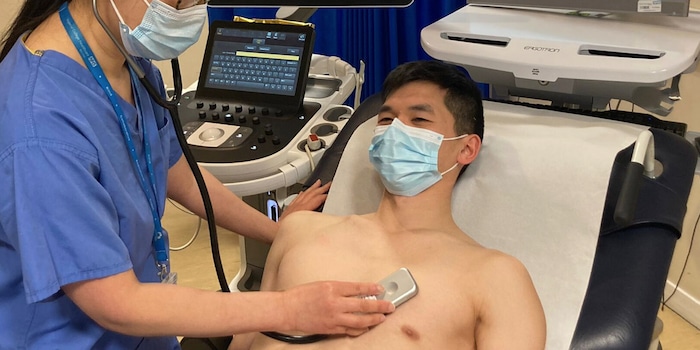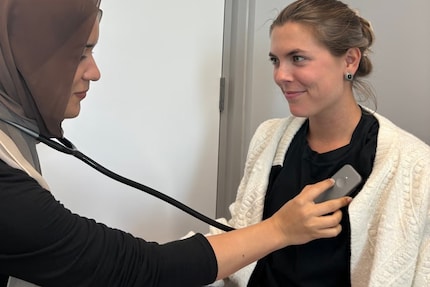
News + Trends
New study: AIs discriminate against humans
by Debora Pape

A classic diagnostic tool gets a digital update: AI stethoscopes analyse ECG and heart murmurs in real time. A British study shows that the technology significantly speeds up diagnoses.
A stethoscope that not only hears, but also thinks: In a large-scale study, researchers from Imperial College London and the Imperial College Healthcare NHS Trust have shown how an AI-powered diagnostic tool can detect three serious heart conditions in seconds.
The technology comes from the US company Eko Health. However, it was tested, customised and clinically validated by British scientists. They used the stethoscope for the first time in a systematic trial in primary care.
The device used, the «Eko Duo», is part of the digital stethoscope product line from Eko Health. The company has specialised in AI-supported cardiac diagnostics for around ten years and works together with the world-renowned Mayo Clinic, among others.
The devices draw heart images at the touch of a button.
The devices record heart and lung sounds as well as ECG data and send them to the cloud for analysis. The company's own AI platform «Sensora», which is certified by the US Department of Health and Human Services, is used there. It recognises patterns in the data and diagnoses relevant heart conditions such as heart failure or atrial fibrillation.
Within 15 seconds, the person treating the patient receives feedback on their smartphone as to whether there is a risk of heart failure. Another algorithm recognises atrial fibrillation, an often asymptomatic arrhythmia that significantly increases the risk of stroke.

The British study, conducted as part of the «Tricorder programme», was carried out in more than 200 GP practices in London. A total of 12,725 patients were examined who showed typical symptoms such as breathlessness, tiredness or swollen legs - all indications of possible heart problems.
The innovation at Imperial College was not in the development of the hardware or the original AI, but in the clinical implementation: the researchers combined Eko's commercial technology with their own AI research. They adapted the algorithms for the UK context and tested how reliable and practicable the system can be used in primary care.
The results are impressive: people who were examined with the AI stethoscope were 2.33 times more likely to be correctly diagnosed with heart failure within the next twelve months. Atrial fibrillation was recognised 3.45 times more frequently and heart valve defects 1.92 times more frequently.
Cardiac insufficiency is often only diagnosed in the emergency department. This is often too late for optimal treatment. The new AI stethoscope could fundamentally change this process. «Until now, GPs have had no simple, precise tools at their disposal to detect heart failure at an early stage», says Dr Mihir Kelshiker from Imperial College London.
With the new tool, GPs could make a well-founded initial assessment directly in the practice and initiate further tests or therapies at an early stage.
Following the successful pilot project, the AI stethoscope is now to be rolled out in other regions such as South London, Sussex and Wales. The researchers see this not only as a medical advance, but also as a relief for the healthcare system. According to studies, early diagnosis could save up to £2400 per patient by avoiding expensive emergency treatment.
The «Eko Duo» is also available from specialist retailers in Switzerland and Germany and is already being used in some doctors' surgeries. However, widespread use in primary care is still in its infancy, as comprehensive clinical studies and authorisations similar to those in the UK are still lacking.
My interests are varied, I just like to enjoy life. Always on the lookout for news about darts, gaming, films and series.